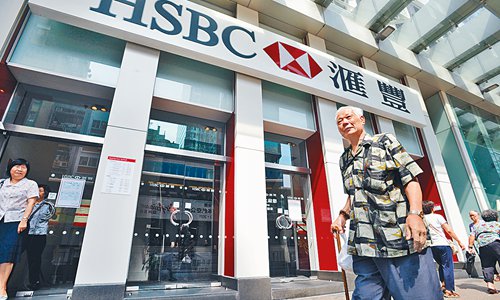HOME >> BUSINESS
HSBC should not play more underhand tricks against China after Huawei case: experts
By Huang Ge Source:Global Times Published: 2019/9/3 22:23:40
HSBC facilitates first yuan-denominated blockchain letter of credit

People pass by a HSBC bank in Hong Kong in February. Photo: IC
HSBC, which was entangled in helping US arrest Huawei's Chief Financial Officer Meng Wanzhou, is attaching importance to the growth of the Guangdong-Hong Kong-Macao Greater Bay Area that offers ample financial services opportunities, but experts warned that if the UK-based bank hopes to further expand in the Chinese market, it should not play more underhanded tricks against China.
HSBC said on Tuesday that it had helped a Shenzhen-based electronics manufacturer complete a yuan-denominated blockchain-based letter of credit transaction.
This pilot deal, which was processed using the Voltron blockchain platform, involved Hong Kong-based MTC Electronic exporting a shipment of liquid crystal display parts and panels to its parent company, Shenzhen MTC Co, across the border from Hong Kong.
It was the world's first such transaction and also the first cross-border letter of credit transaction made in the Guangdong-Hong Kong-Macao Greater Bay Area, which showed HSBC's efforts to promote trade within the region, read a statement that HSBC sent to the Global Times.
HSBC has been committed to providing services for China's economic and trade contacts with the world, said Florence Tan, country head of global trade and receivables finance of HSBC China.
"The transaction… showed the enormous potential of promoting the yuan as a currency for trade settlement and will create large value for Chinese trade companies," Tan was quoted as saying in the statement.
The Guangdong-Hong Kong-Macao Greater Bay Area, which makes use of such advantages as Shenzhen's high-technology manufacturing sector, Hong Kong's financial market and Macao's tourism industry, is a great attraction to foreign companies, and HSBC is no exception, said Cao Yuanzheng, chief economist at Bank of China International.
HSBC, like many domestic and foreign financial institutions, is striving for business and cannot give up such an attractive chance to develop in the region, Cao told the Global Times on Tuesday.
But HSBC is unlikely to find an easy growth path in the Chinese market compared with the past because what the bank did to Huawei has affected its reputation and also affected evaluations by its Chinese clients, experts noted.
Since June, HSBC has been lobbying the Chinese government not to blame it for the arrest of Meng, saying it had no choice but to cooperate with the probe and provide information that US authorities needed to build a case against Huawei, said media reports.
HSBC is an apple-polisher circling around China and the US - it longs for profits from the Chinese market while carefully seeking self-protection under pressure from US hegemony, the so-called long-arm jurisdiction, said Wang Yiwei, a director of China's Institute of International Affairs at Renmin University in Beijing.
As to foreign companies like HSBC that play underhanded tricks against China while making profits in the Chinese market, punishments, such as warnings or putting them on the country's unreliable entity list, are necessary, Wang told the Global Times on Tuesday.
An increasing number of Chinese netizens are calling for blacklisting HSBC, and some have said that the bank should be one of the first companies put on China's unreliable entity list.
HSBC should learn a lesson from the Huawei case, which can be seen in its shift of two executives within one week in August, said Dong Dengxin, director of the Financial Securities Institute at the Wuhan University of Science and Technology.
HSBC Holdings' Greater China Chief Executive Helen Wong resigned from her position on August 9, four days after CEO John Flint handed in his resignation.
Newspaper headline: HSBC facilitates first yuan-denominated blockchain letter of credit
Posted in: COMPANIES